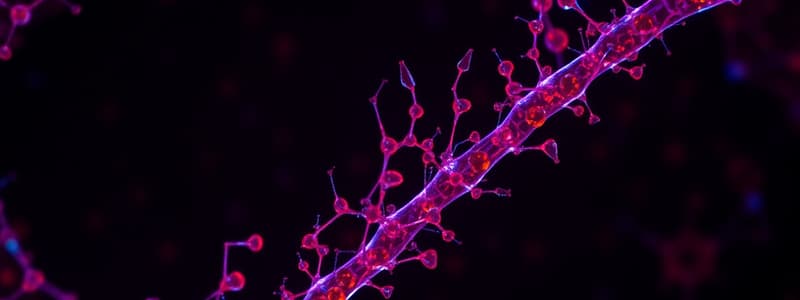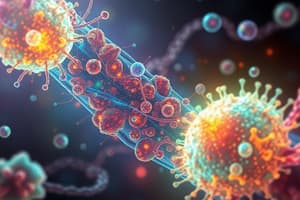Podcast
Questions and Answers
What is the primary focus of conservation biology?
What is the primary focus of conservation biology?
- Investigating biological processes
- Examining ethical dilemmas in research
- Studying microorganisms
- Protecting endangered species and ecosystems (correct)
Which of the following best describes the role of physiology in biology?
Which of the following best describes the role of physiology in biology?
- It focuses solely on plant life.
- It investigates how organisms function and maintain homeostasis. (correct)
- It studies the structure of ecosystems.
- It examines the impact of microorganisms in health.
What aspect of microorganisms is important for human health?
What aspect of microorganisms is important for human health?
- All microorganisms are harmful and should be eradicated.
- Some microorganisms are beneficial while others can cause disease. (correct)
- Microorganisms do not play any role in ecosystems.
- Only viruses have an impact on human health.
Which of the following issues is commonly examined in bioethics?
Which of the following issues is commonly examined in bioethics?
Why is understanding physiology crucial for healthcare?
Why is understanding physiology crucial for healthcare?
Which of the following accurately describes prokaryotic cells?
Which of the following accurately describes prokaryotic cells?
In molecular biology, which process describes the flow of genetic information from DNA to protein?
In molecular biology, which process describes the flow of genetic information from DNA to protein?
Which of the following best represents the concept of natural selection?
Which of the following best represents the concept of natural selection?
What are the fundamental characteristics shared by all cells?
What are the fundamental characteristics shared by all cells?
What is a significant focus of genetics?
What is a significant focus of genetics?
Which of the following is NOT a level of organization studied in biology?
Which of the following is NOT a level of organization studied in biology?
Which type of genetics describes the patterns of inheritance primarily related to dominant and recessive alleles?
Which type of genetics describes the patterns of inheritance primarily related to dominant and recessive alleles?
What aspect of ecology examines the interactions between species?
What aspect of ecology examines the interactions between species?
Flashcards
Biodiversity
Biodiversity
The variety of living organisms within an ecosystem, encompassing species, genetic diversity, and ecosystems.
Physiology
Physiology
The study of how organisms function, including organ systems and their interactions.
Microbiology
Microbiology
The study of microorganisms, including bacteria, viruses, fungi, and protists.
Bioethics
Bioethics
Signup and view all the flashcards
Conservation biology
Conservation biology
Signup and view all the flashcards
What is biology?
What is biology?
Signup and view all the flashcards
What are cells?
What are cells?
Signup and view all the flashcards
What are prokaryotic cells?
What are prokaryotic cells?
Signup and view all the flashcards
What are eukaryotic cells?
What are eukaryotic cells?
Signup and view all the flashcards
What is molecular biology?
What is molecular biology?
Signup and view all the flashcards
What is evolution?
What is evolution?
Signup and view all the flashcards
What is ecology?
What is ecology?
Signup and view all the flashcards
What is genetics?
What is genetics?
Signup and view all the flashcards
Study Notes
Introduction to Biology
- Biology is the natural science studying living organisms (animals, plants, fungi, protists, archaea, and bacteria).
- It encompasses various levels of biological organization, from molecules to ecosystems.
- Key biological themes include evolution, genetics, ecology, and cell biology.
- Studying biology helps understand the complexity of life processes.
Cell Biology
- Cells are the fundamental units of life.
- All living organisms are composed of cells.
- Cells share fundamental characteristics, including a plasma membrane, cytoplasm, and genetic material.
- Prokaryotic cells lack a nucleus and membrane-bound organelles.
- Eukaryotic cells have a nucleus and membrane-bound organelles.
- Cell structures and organelles carry out specific functions for cellular survival.
Molecular Biology
- Molecular biology examines the biological activity of molecules in living organisms.
- It focuses on the structure and function of DNA, RNA, proteins, and other biomolecules.
- Understanding molecular interactions is crucial for comprehending cellular processes.
- The central dogma describes the flow of genetic information: DNA to RNA to protein.
- DNA replication, transcription, and translation are essential molecular processes.
Genetics
- Genetics investigates genes, heredity, and variation in organisms.
- Genes are DNA segments instructing protein synthesis.
- They control traits and characteristics passed from parents to offspring.
- Mendelian genetics explains inheritance patterns via dominant and recessive alleles.
- Modern genetics studies complex traits and applies genetic technologies.
Evolution
- Evolution is the process of species change over time.
- Natural selection is a key evolutionary mechanism: organisms with advantageous traits reproduce more.
- Evidence for evolution comes from comparative anatomy, molecular biology, and the fossil record.
- Phylogenetic trees visualize evolutionary relationships between organisms.
- Understanding evolution clarifies the diversity of life.
Ecology
- Ecology studies the relationship between organisms and their environment.
- It examines populations, communities, ecosystems, and the biosphere.
- Factors like climate, resources, and interspecies interactions influence ecological processes.
- Biodiversity is the variety of life forms in an ecosystem.
- Conservation biology protects endangered species and ecosystems.
Physiology
- Physiology investigates how organisms function.
- It explores mechanisms underlying biological processes (digestion, respiration, reproduction).
- Organ systems work together to maintain homeostasis.
- Physiology is crucial for healthcare and agriculture.
Microbiology
- Microbiology studies microorganisms (bacteria, viruses, fungi, protists).
- Microorganisms play vital roles in ecosystems and human health.
- Some are beneficial, others cause diseases.
- Microbiological techniques are essential for research.
Bioethics
- Bioethics examines ethical issues in biological research and applications.
- Topics include genetic engineering, stem cell research, and animal welfare.
- Ethical considerations are critical for responsible and beneficial biological knowledge applications.
Studying That Suits You
Use AI to generate personalized quizzes and flashcards to suit your learning preferences.




